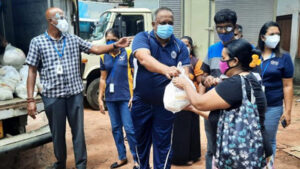GRI supports local communities during pandemic
Colombo, Sri Lanka – GRI has always taken its social responsibility seriously, and throughout the years the company has been very active in supporting the communities that are within its ecosystem. Yet, during times of natural disasters, or more recently in the case of the prevailing COVID-19 pandemic, GRI has taken steps to provide its support to areas that require the most urgent assistanc,e even outside its ecosystem. “While building the business, it is important for any corporation to inculcate a culture within the organization around supporting people,” explained Prabhash Subasinghe, managing director, GRI. “We are also giving back to the country by building the tire industry, which is predominately engaged in exports; thus bringing in the much needed foreign currency to the country.”
As a responsible company, GRI has always recognized the importance of giving back to the country and its people. Historically, GRI has focused on the ecosystem within which it works. However, when the nation requires assistance, the company does not hesitate to extend its support. As Subasinghe says, “It is ingrained in our DNA as an organization to give back to society.”
With the advent of the COVID-19 pandemic in 2020, GRI stepped up its CSR initiatives through the GRI Care program, where it supported communities within and outside its ecosystem. Similarly, with the surge of the third wave of the pandemic this year, GRI understood that the entire medical system was stressed and that government hospitals required support. As soon as the requirements of the hospitals were released, Subasinghe took the initiative to inquire on the most urgent needs, and within a short period, two high-function ICU beds were donated to the Gampaha Hospital. Though it is one of the largest and best equipped hospitals in the country, the Gampaha Hospital had never received such medical equipment previously. It was indeed encouraging to hear that within a couple of days of providing the ICU beds, a 40-year-old man’s life was saved because the hospital had the necessary equipment. “I am happy that we have been able to make a difference and save lives,” said Subasinghe.
Similarly, GRI has donated ICU beds to the Kosgama Hospital in Avissawella upon the request of the Ministry of Health. The Kosgama Hospital has very limited resources and such medical equipment was an essential requirement. Furthermore, support was provided to the Negombo Hospital in the form of medical equipment, as there were critical needs to be fulfilled. “Each person contributes in the way they can; the numbers are always relative. We find many individuals assisting, as well. But responsible corporates need to step up and give back to the country. That is also a reason we do business, to give back to society,” explained Subasinghe. Recognizing that it is the daily wage earners and their families who are severely affected by the current lockdown, GRI distributed food rations to over 350 families on two separate occasions in Colombo.
GRI sources natural rubber from Sri Lankan farmers. During this period where the farmers are unable to travel to the rubber collection centers in Monaragala, GRI took the initiative to go directly to the farmer to collect rubber; thereby ensuring that the rubber farmers’ livelihoods continue. Even in the future, GRI will look at supporting the rubber farming community during challenging times.
‘Caring’ is one of the core values of GRI; the company has continuously engaged in programs to support the community within its ecosystem. It has always been part of the organizational culture that it is a primary duty as people to assist the country during times of need where GRI goes beyond its immediate community and supports the greater society. With GRI Care being formalized, the company will continue to engage in various projects to assist the people of Sri Lanka.
“It is important not only for me as an individual, but to all our employees to be a part of an organizational culture where caring is a part of our DNA. You need to do the right thing at the right time. For GRI, it is not only about business; we look at humanity first,” explained Subasinghe.
GRI produces high-grade specialty tires that are built sustainably using pure natural rubber in Sri Lanka. Founded in 2002, the company produces material handling solid tires, radial agriculture tires and construction tires. GRI has operations in nine countries, and a business presence in more than 50 countries. In 2018, GRI opened an advanced manufacturing plant in Sri Lanka to produce radial agricultural tires. In 2020, GRI commenced construction of a large mixing facility for tire compounds, and in 2021, began further expansion of its advanced specialty tire plant. GRI ensures its commitment to sustainability and environmental protection through all its strategies and processes.

